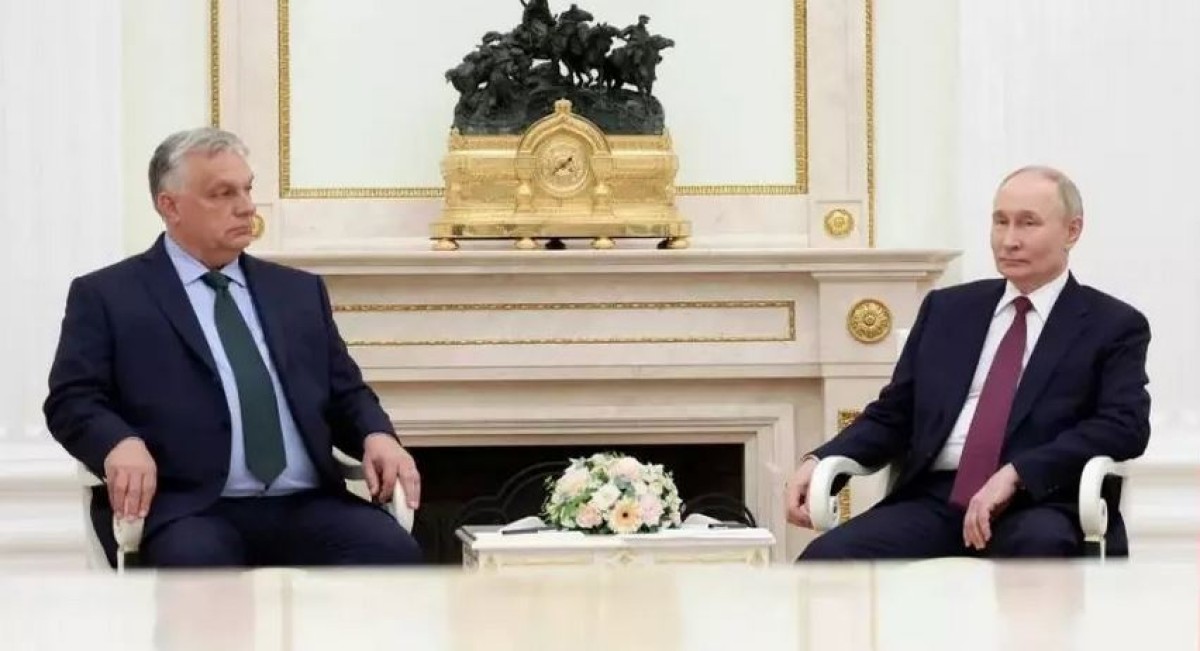 512
512
The Peace Mirage: Orbán’s Moscow Visit and Its Hidden Motives
The Peace Mirage: Orbán’s Moscow Visit and Its Hidden Motives
By: M. S. Qorbani
Hungarian Prime Minister Viktor Orbán's recent visit to Moscow on July 5, ostensibly to discuss a Ukraine peace settlement with Russian President Vladimir Putin, represents a controversial maneuver that has drawn sharp condemnation from Kyiv and European leaders alike. This rare instance of a European leader visiting Russia amidst ongoing conflict underscores a complex diplomatic landscape, marked by Orbán's earlier unannounced visit to Ukraine, where he met Ukraine’s beleaguered President Volodymyr Zelenskyy and suggested an immediate ceasefire with Russia.
Orbán's actions, which he frames as part of a broader "Ukraine peace initiative," have faced significant backlash from his fellow European Union members. Hungary's current six-month EU presidency affords the Central European nation the capacity to influence the EU's agenda, a power Orbán appears eager to wield. However, this move is perceived by many within the Union as a potential weakening of Brussels' stance on the protracted conflict with Russia. The EU, a 27-member bloc, has steadfastly opposed Russia's military aggression against Ukraine, implementing an unprecedented 14 rounds of sanctions against Moscow in response.
The trip drew particular ire from prominent EU figures, including EU Council President Charles Michel, European Commission President Ursula von der Leyen, and EU foreign policy chief Josep Borrell. These officials were unequivocal in their condemnation, asserting that Orbán, despite his role as a national leader, does not represent the EU in such negotiations.
In a meeting convened in Brussels on July 10, EU ambassadors deliberated on the implications of Orbán's visits to Russia and China, scrutinizing the impact on Hungary's EU presidency. The ambassadors collectively criticized Orbán for leveraging the EU presidency and its symbols during his visits, arguing that this act undermined the unity of the 27 member states and contravened established treaties and regulations. The dissatisfaction was palpable, with officials deeming Orbán's actions a breach of protocol and calling for greater adherence to collective EU commitments, particularly regarding engagements with Russian officials.
The Ukrainian Ministry of Foreign Affairs also expressed its disapproval, denouncing Orbán's unilateral decision to visit the Kremlin without prior consultation or coordination with Ukraine. The ministry's statement urged all parties to honor their commitments and avoid unauthorized meetings with Russian representatives.
In defense, Hungary maintains that Orbán's visits were conducted in his capacity as the nation's prime minister, not as an EU representative, aimed at exploring potential ceasefire prospects in the ongoing Russo-Ukrainian conflict. Nevertheless, the televised joint statement from Putin at the Kremlin, wherein he suggested that Hungary should speak on behalf of Europe, further complicated the narrative, indicating a potential misalignment in Orbán's diplomatic intentions and public messaging.
This diplomatic episode has exacerbated existing rifts within the EU, prompting discussions about potential boycotts of informal EU ministerial meetings presided over by Hungary. The political friction extends to the European Parliament, where leaders of the liberal "Renewal of Europe" and "Greens" parties voiced strong opposition to Orbán's EU presidency, calling for its termination. Valerie Heyer, leader of the "Renewal of Europe" group, articulated a collective sentiment, accusing Orbán of undermining the EU's stance and acting against its collective interests.
The prospect of prematurely ending a member state's rotating presidency is fraught with complications, given the absence of a direct legal mechanism within EU treaties. Diplomatic channels and political pressure remain potential, albeit unlikely, avenues for addressing this unprecedented situation. Most EU members are cautious about setting a precedent that could destabilize the rotational presidency system, which provides smaller countries with an opportunity to influence EU policy.
Orbán's warm relations with Putin, coupled with his habitual obstructions to EU efforts supporting Kyiv and sanctioning Moscow, have alienated Hungary from its EU and NATO allies. His advocacy for ending hostilities in Ukraine, absent considerations for the nation's territorial integrity or future security, has drawn widespread criticism. Orbán's self-proclaimed "mission of peace" during Hungary's EU presidency starkly contrasts with the prevailing consensus within the Union, highlighting a profound ideological and strategic divergence.
Orbán's enduring leadership since 2010, punctuated by an additional term in the late 1990s, reveals an ambitious figure seeking to elevate Hungary's geopolitical stature through strategic alignments with global powers like Russia, China, and the United States. However, Hungary's intrinsic limitations—geographical and demographic—diminish its perceived influence, rendering its mediation efforts in the Ukraine conflict largely ineffectual in the eyes of more prominent European states.
This discord within the EU reflects a deeper struggle against the hegemonic forces of capitalist exploitation and imperialist agendas. Orbán's actions highlight the contradictions within the EU, where national interests often clash with collective solidarity. The pursuit of peace, while ostensibly noble, is tainted by underlying motives that prioritize geopolitical maneuvering over genuine proletarian solidarity. This situation underscores the necessity for a unified, class-conscious approach to international diplomacy, one that transcends the capitalist frameworks that currently dictate the actions of states and institutions alike.
 512
512
Comment
Post a comment for this article